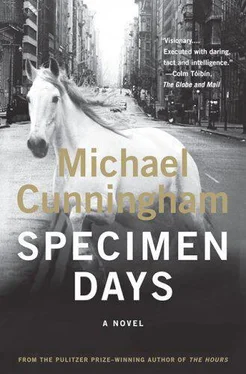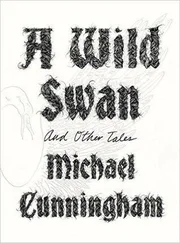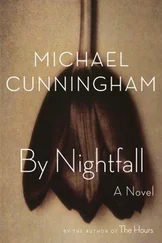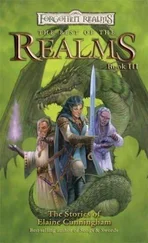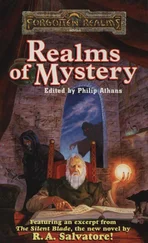Michael Cunningham - Specimen Days
Здесь есть возможность читать онлайн «Michael Cunningham - Specimen Days» — ознакомительный отрывок электронной книги совершенно бесплатно, а после прочтения отрывка купить полную версию. В некоторых случаях можно слушать аудио, скачать через торрент в формате fb2 и присутствует краткое содержание. Город: New York, Год выпуска: 2005, ISBN: 2005, Издательство: Farrar, Straus and Giroux, Жанр: Современная проза, на английском языке. Описание произведения, (предисловие) а так же отзывы посетителей доступны на портале библиотеки ЛибКат.
- Название:Specimen Days
- Автор:
- Издательство:Farrar, Straus and Giroux
- Жанр:
- Год:2005
- Город:New York
- ISBN:0-374-70515-1
- Рейтинг книги:4 / 5. Голосов: 1
-
Избранное:Добавить в избранное
- Отзывы:
-
Ваша оценка:
- 80
- 1
- 2
- 3
- 4
- 5
Specimen Days: краткое содержание, описание и аннотация
Предлагаем к чтению аннотацию, описание, краткое содержание или предисловие (зависит от того, что написал сам автор книги «Specimen Days»). Если вы не нашли необходимую информацию о книге — напишите в комментариях, мы постараемся отыскать её.
Specimen Days — читать онлайн ознакомительный отрывок
Ниже представлен текст книги, разбитый по страницам. Система сохранения места последней прочитанной страницы, позволяет с удобством читать онлайн бесплатно книгу «Specimen Days», без необходимости каждый раз заново искать на чём Вы остановились. Поставьте закладку, и сможете в любой момент перейти на страницу, на которой закончили чтение.
Интервал:
Закладка:
“Oh, she can’t come with us.”
“What do you mean?”
“I’m sorry. I’d assumed you understood. Our space is limited. We anticipate some mortality en route, and we’ve tried to allow for that. But we can’t carry a dead body for thirty-eight years. I’m afraid it’s out of the question.”
“You mean to leave her here, then.”
“In a short while, she won’t even know where she is. She wouldn’t be eating anymore, under any circumstances. We’ll leave water for her on the off chance, but I doubt she’ll want that, either.”
“You’ll let her die alone.”
“It will mean something different for her from what it might mean to you. Nourtheans are more solitary. She’ll be all right. Believe me.”
“Sure.”
“Now you really must excuse me. You can’t imagine what all I’ve got to do.”
“Of course.”
She hurried toward the house.
The day passed. Luke finally appeared, riding the horse with Twyla. He seemed to have joined the children in some way that implied membership without trust or affection. Simon saw them approaching from beyond the house. Luke sat behind Twyla like a boy pharaoh, regal and indignant-looking, as the smaller children capered in the horse’s wake. Twyla reined the horse in Simon’s direction, brought it to a halt just shy of the place where he stood. The horse blinked and shook its head. It made a low snorting noise that sounded vaguely like the word “hunk” played on an oboe.
Twyla said to Simon, “Do you like horses?”
“Who doesn’t?” he said.
“It seems that there will be no horses in the new world.”
Right, she was crazy, too. Still, she had her own version of Catareen’s lambent lizard eyes and nervous, undulating nostrils. Her gaze made Simon’s circuits buzz.
He said, “Maybe there are horses there already.”
“I will never love a horse other than Hesperia,” Twyla announced. “Not on any planet.”
“Give me a break,” Luke said.
“I’m not sure what you mean by that.”
“What I mean is, it’s just an animal”
Twyla reined the horse around and kicked it into motion again. As they departed, followed by the other children, Simon could hear Twyla saying to Luke, “You have a great deal to learn about the kingdom of animals. They are as various as any other race of beings.”
“They’re food. Any being that can’t open a bottle or loan you money is by definition…”
Simon watched them ride away. He understood that they would be carrying on this conversation together for the next eighty years or more. He wondered if Othea already had Luke in mind for Twyla. He wondered if they would have children.
He said a silent goodbye to Luke. He wished him luck.
Finally he returned to Catareen’s room. There was nowhere else for him. He felt calmer there. It was the one place in which he seemed to be something other than a tourist.
She slept, mostly. He sat in the single chair at her bedside, watching her. He tried to imagine her life her long life, as it turned out before she came here. She would never, he thought, have been a particularly easy person. She must always have been defiant and stern, even by Nadian standards. She must always have harbored a privacy so deep it was almost audible, like the silence of a well. He suspected that her husband had been the friendlier one, the one with ease and amplitude. Simon thought he could picture them at home, in their hut of sticks and mud. The husband would have been forever welcoming others in, offering pipes and fermented drinks, warming the rooms by lighting fires with wood they could not easily spare.
He would have exasperated Catareen. His profligacy would have inspired countless arguments, some of them bantering, some of them bitter.
And yet, she must have loved him.
Simon knew this, somehow. He could feel the information swarming inside his head, one cell splitting into two, two into four, four into eight.
Here was Catareen’s long union. Here were her children, five of them, three girls and two boys, endlessly undecided about which of their parents was more to blame for the errors and injustices in the family. Here were their days of labor. Here were their nights together, on a mattress stuffed with leaves and hay. Here was an afternoon of no particular consequence, when Catareen stood in the doorway of her hut, looking at her village, at the sharp peaks beyond, at the pewter-colored sky that would soon release its rain; here were the sounds of her children at some game, mixed with the steady rhythm of her husband’s hoe in the garden out back; here was her sense of herself in the middle of a life that was hers and no one else’s. Here was the bittersweet savor of it, the piercing somethingness of it the pure sensation of being Catareen Callatura, at that moment, on an afternoon of no consequence, just before a rain.
And here, many years later, was her decision to withhold crops from the king’s collectors and to encourage others to do the same. Here were the doubts of her garrulous husband, a simpler soul than she. Here was his trust in her. Here were the children’s arguments, with her and among themselves. (Some would have decided by then that she was the good parent, others that she was the bad.) Here were the arrests. Here were the executions. All of them. Not only the sweet, baffled husband but the grown children, the ones who loved her and the ones who resented her, and their children, too. All of them.
The room darkened with evening. Catareen woke several times, looked around uncertainly. She must have been surprised to find herself here, dying in an unfamiliar room on a strange planet. She must, in her sleep, have forgotten. Each time she woke, Simon leaned over her and said, “It’s all right,” which was not, of course, strictly true. It was something to say.
He didn’t think she’d want him to touch her. Each time she looked at him with fading yellow eyes. Each time she drifted away again without speaking.
Presently, Luke came into the room. “Hey,” he said. “It’s almost time to get aboard.”
Simon knew by then what he would do. He seemed to have entered a decision without quite making it. The process had occurred somewhere deep in his circuitry.
He said, “I’m not going.”
“What?”
“I can’t leave her here.”
Luke hesitated. Then he said, “There’s nothing we can do for her, you know.”
“I can be here. I can do that.”
“Do you know what that means? We can’t turn around and come back for you.”
“I know that.”
“I want you to come,” Luke said. There was a hint of whine in his tone.
He was in fact a twelve-year-old boy. It was easy to forget that.
Simon said, “You’ll be fine without me.”
“I know. I know I will. I still want you to come.”
“What’s that you’ve got there?” Simon asked. Luke was holding something in a white plastic bag.
“Oh. Just this.”
He reached into the bag and produced the little china bowl they’d bought from the old woman in Denver.
“You’re taking that to another planet?”
“It was my mother’s.”
“What?”
“I don’t know how Gaya ended up with it. We left Denver kind of quickly, one of Mom’s credit-card things blew up, and I guess Gaya got to our apartment before the authorities did. I remember this bowl from when I was a baby. Mom must have boosted it. She’d never have bought something like this.”
Luke stood holding the bowl in both hands. It appeared to put out a faint glow in the darkening room.
“Is there some kind of writing on it?” Simon asked.
“Doesn’t mean shit.”
“Come on.”
“It’s a language from some loser country. One of those places with horrible weather and a long line of demented rulers. One of those places that seem to have existed only so their citizens could devote their lives to trying to get the hell out.”
Читать дальшеИнтервал:
Закладка:
Похожие книги на «Specimen Days»
Представляем Вашему вниманию похожие книги на «Specimen Days» списком для выбора. Мы отобрали схожую по названию и смыслу литературу в надежде предоставить читателям больше вариантов отыскать новые, интересные, ещё непрочитанные произведения.
Обсуждение, отзывы о книге «Specimen Days» и просто собственные мнения читателей. Оставьте ваши комментарии, напишите, что Вы думаете о произведении, его смысле или главных героях. Укажите что конкретно понравилось, а что нет, и почему Вы так считаете.
